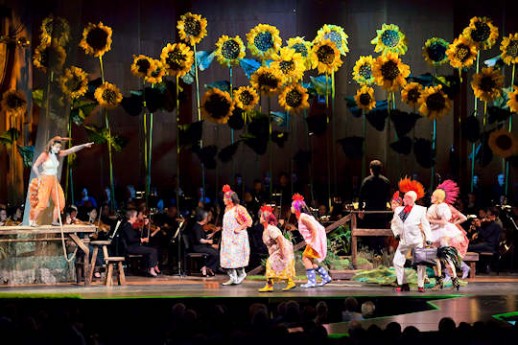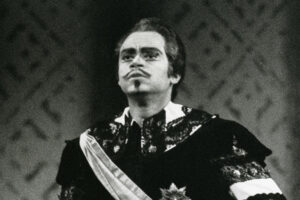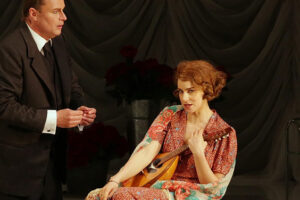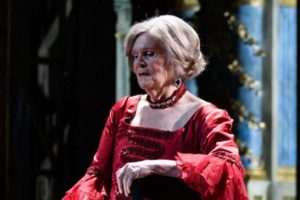

The pieces have a lot in common: Ligeti, who ranked Janácek just behind Stravinsky and Bartók in his Twentieth Century Top Three, seems to have borrowed from him the piquant atmospherics and diabolical brass stings that Alan Gilbert rendered so well last season—and the weird beauty Gilbert illuminated deep within the gnarls and tangles of Ligeti’s grotesque score is just the sort of thing you’ll find in every bar of Janácek’s great operas.
Both operas are also impossible to stage “realistically.” Le Grand Macabre was inspired by a puppet show, Príhody Lišky Bystroušky by a comic strip, and presenting either means dealing imaginatively with serious problems of scale.
How do you put the end of the world on stage? How do you direct a scene that plays out between an opera singer playing a gamekeeper and an opera singer playing a mosquito? Director Doug Fitch‘s Giants Are Small was, as their name suggests, exactly the right team to handle these challenges. Whatever Le Grand Macabre lacked in visual attractiveness, it made up for in sophistication, clarity and ingenuity.
So picture my delight (artist’s rendering: “:-D”) upon walking into the hall for Vixen and finding that the whole stage was done up quite attractively, with golden light (lights designed by Clifton Taylor) and towering, oversized sunflowers (scenery designed by the director, with G.W. Mercier) and hardly at a loss for visual appeal.
Then out came the children, dressed up as li’l insects and assorted forest creatures, and it soon became apparent that the designs here (also by Fitch) were also going to be as attractive as they were clever, clearly evocative without aiming for anything like realism—little Yves Mervin-Leroy‘s frog costume had clearly been, in a previous life, a lime hoodie and a light green A&F tee, while the Vixen’s “haunches” were actually created using a pair of cargo shorts (finally, a use for cargo shorts!) in a very vivid, specific, satisfying rust-orange.
The cast, including the kids, moved with appropriately animal grace, and during those passages where the audience is supposed to be dazzled by the beauty of nature, the stage was full of life, right up to he end of a runway snaking out from the apron into the audience, and so the effect really came off. And yet the interactions between the characters seemed imprecise in a way I can’t put my finger on—which probably nullifies my complaint (a vagueness I can only describe vaguely = never mind), but still, some kind of clarity seemed lacking that I didn’t miss at Macabre.
Another reason Vixen was a promising piece for this sort of treatment: placing the orchestra onstage with the singers has real advantages in an opera this richly orchestrated. I mean, I’m the guy, when I go to the opera, who keeps his eyes glued to the stage and basically wouldn’t notice what the orchestra was doing unless the first horn not only cracked a high note but actually caught on fire.
But I fucking love orchestral music (as I’m sure did most of the audience, which is why they’re NY Phil fans), and Janácek was one of the great orchestral composers of the 20th century, even though—since most of it was written for an orchestra that sits in a hole in the ground—you’ll never hear him in the concert hall, aside from a handful of sort-of chestnuts. And then there are the orchestral interludes in his operas, where the orchestra is supposed to be the center of attention, but you’ll sprain your neck craning to watch them.
So here was a chance to put some of his most luxurious writing under the bright lights and give it a good close look, and it was ravishing. Gilbert delivered; not only did he supply the requisite atmospherics and dramatic effects, but his unsentimental approach to tempo and sophisticated control of dynamics yielded moments of real intensity—during the vixen’s transfiguration scene, for instance, just where you’d expect him to hang back and indulge, he instead drove the orchestra urgently forward, and at the end of it I found myself just beggin’ for more, but in the good, “always leave them wanting more” way.
The disadvantage of putting the orchestra onstage, of course, is that it makes it a lot harder to hear the damn singers, so on my little Opera Queen scorecard I was basically rating everybody entirely according to how loud they were.
It seems kind of dumb to sing an opera in English translation with a composer like Janácek, who was ALL ABOUT the music inherent in his native tongue, and so you can’t understand what anybody’s saying anyway because the speech-rhythms are perversely inappropriate, and anyway there were projected supertitles giving the English translation already, and anyway the supertitles didn’t even MATCH the sung text part of the time (whether that was due to singerly flubs or edits to the text I can’t say), and anyway it’s OPERA so people’s words are distorted all to heck because they have to sing them on high notes, but on top of all of that the balance was all screwed up by the positioning of the orchestra vs. singers, so there were plenty of moments when we had to look at the supertitles just for the gist.
Anyway, here’s who scored high on my little checklist: Isabel Bayrakdarian, of course, who sounded as sexy and free as every little vixen should; Kelley O’Connor (as Lapák the dog), who went to school with me, and so I am TOTALLY IN THE TANK, but I can’t get enough of her dark-yet-brassy voice, so shut up; Alan Opie as the Forester; Wilbur Pauley (whose stainless-steel diction you’ll remember from Macabre, if you were at Macabre), and Joshua Bloom (also in Macabre) as Harašta, the poultry dealer who, SPOILER ALERT, kills the Vixen for her fur.
Actually, maybe that’s one more useful comparison between Vixen to Macabre—their surprising optimism in the face of death. Obviously, Ligeti’s might-as-well-live nihilism is a bit darker, but aren’t his nihilism and Janácek’s pantheism two sides of the same coin?
In the opera’s final scene, a shower has just passed over; the Forester reflects upon the springtimes of his lost youth and says something like, boy I hate these mosquitos, but I love it when the sun comes out in the evening!, which (you’ll have to excuse my maybe not so great translation from the Czech but) is kind of what the whole piece is about.
Life is full of people killing and dying for no good reason, loving and suffering in vain, a wandering from darkness to darkness, but between the darkness of the storm and the darkness of dusk sometimes there’s a great light that makes everything seem beautiful again. What makes life worth the living after all is the beauty of the things we can’t control, be it the untamable heart of that fickle somebody, or an untamable beast of the forest. The sun so seldom comes out when we want it to, but it will always come out again.
(Photo: Chris Lee)
























Comments